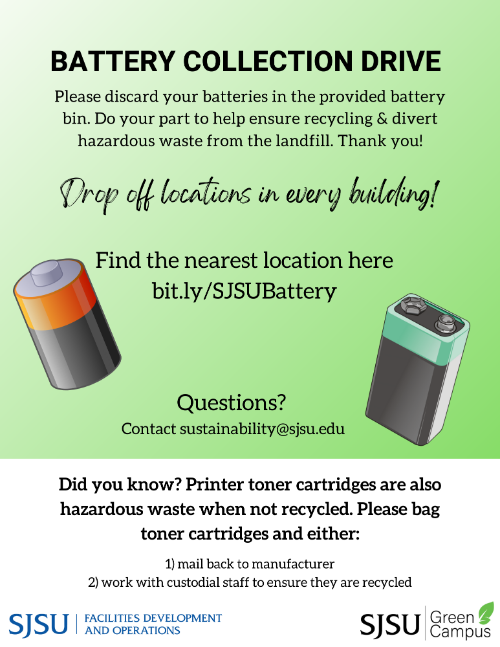Waste Management
Waste Management at San José State University
The University is committed to reducing waste generated on campus, and, as a state agency, SJSU follows applicable policies and statutes.
SJSU continues to use GreenWaste Recovery and a single stream collection process. All yard waste and food waste generated on campus is either composted at the hauler’s facilities or used in a waste-to-energy facility. All other (mixed) waste is taken to the GreenWaste materials recovery facility (MRF), in which any recyclable and compostable items are removed from the trash and processed appropriately. The remaining small amount of waste, which cannot be diverted, is transported to the landfill or to a waste-to-energy facility.
Recent Accomplishments
In the past year, SJSU diverted 5,000 tons of materials from solid waste landfill/incinerators, while disposing only 1,500 tons of materials. Our campus diversion rate for 2022 is 70 percent.
Battery Collection Program
To divert hazardous waste on campus from the landfill, the Office of Sustainability partnered with the campus’s Environmental Health and Safety Office to begin a Battery Collection Program that included drop-off bins in all offices around campus and in all Student Housing buildings. Within the first 2 months of the program, over 54 liters of batteries were collected.
Battery collection bins on campus

Recycling Programs
The Facilities Development and Operations department (FD&O) offers multiple recycling programs on campus to reduce waste. These programs either reuse discarded items or dismantle them for proper disposal.
|
|
To help reduce residence hall move-out waste, move-out events have been organized at the end of each academic year to encourage waste diversion and to prevent illegal dumping. SJSU provided free waste disposal option and donation services for SJSU student residents. Each event had university and City of San Jose staff hosting tables to provide outreach materials regarding disposal of household garbage and recycling, and disposal of large items.
CSU Single-use Plastics Policy
After months of collaborations across the California State University (CSU) system, the CSU Chancellor’s Office has passed a new policy on single-use plastics that went into effect on December 17th, 2018. The
policy will require all CSU campuses to eliminate plastic straws, single-use plastic carryout bags, single-use Styrofoam, plastic water bottles, and replace single-use plastic items with materials that are reusable, locally compostable, and/or recyclable by 2023.
To find the nearest water bottle filling station, click here [pdf].
Objectives for 2030
Draft Zero Waste Management Plan and complete by end of the academic year.
- Waste reduction on campus
- Achieve 90% diversion or higher
- Zero Waste Certified by U.S Zero Waste Business Council
The campus will be working together collaboratively to achieve these goals and work on behavior change campaigns to educate the campus community on the importance of reducing single-use plastics. Additionally, the Office of Sustainability will be working in concert with Contracts & Purchasing Services to conduct an audit of current campus purchases with the goal of increasing the sustainability within our supply chain.
Hazardous Waste
To eliminate the risk of harmful exposure, hazardous waste is regulated by both federal and state law. Hazardous waste from the University’s operations, including laboratories, is managed according to the procedures of the Hazardous Waste Management manual. This includes labeling all hazardous waste properly and disposing of it within a year or less. Universal waste is coordinated by the Environmental Compliance Specialist to ensure safe recycling. This includes: batteries, used lamps, non-PBC and PBC light ballasts, computers/monitors, and electrical/electronic equipment.
Additional Resources:
Center for the Development of Recycling
Facilities Development & Operations
Franchise Agreement
In compliance with AB 2048, we have made available the current franchise agreement [pdf] between our contracted solid waste and recycling haulers and SJSU.
